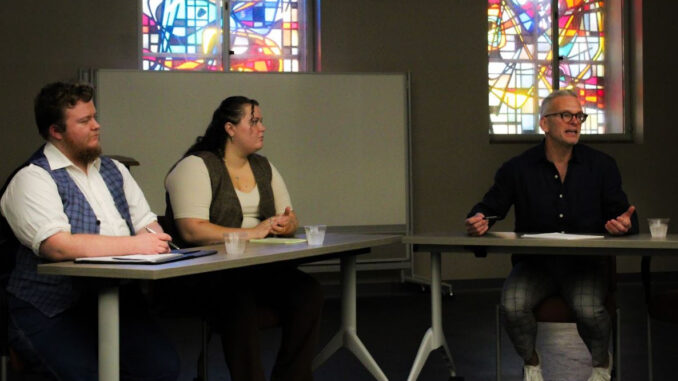
Megan Trotter | News Editor
On the heels of the passage of Pittsburgh’s gender-affirming sanctuary city bill on Sept. 12 a group of Duquesne panelists discussed potential implications.
While they praise the concept they question the practical ramifications of potentually inviting large numbers of transgender people into the city for care.
The event was hosted by Sigma Tau Delta, Department of English and McAnulty College of Liberal Arts Women’s and Gender Studies. Panelists included assistant professor Ralph Klotzbaugh, recent Duquesne graduate Michael Murphy and counseling intern Julia Reedy.
The trio discussed the underlying implications of the bill’s passage and what this change could look like for transgender individuals in and around the Pittsburgh area. While Pittsburgh’s declaration of sanctuary seemed like a step forward, they were concerned about the extreme lack of available resouces.
Reedy already said she has already experienced severe issues caused by understaffing.
“My practice that I work at has probably 30 counselors who take on upwards of 30 clients a week. That’s a lot of people, and we still aren’t able to help everyone. It’s just not possible,” she said.
The bill passed with an 8-0 vote and amended a 2011 ordinance designating Pittsburgh as a “Human Rights City.” According to Pitt News, “The bill will protect healthcare providers, as well as recipients of care and their legal guardians, from out-of-state investigation or prosecution.”
Pittsburgh has had a few moments in history for showing support for transgender rights. In 2016, Pittsburgh City Council unanimously voted to ban conversion therapy for minors who identify as gay, lesbian, bisexual or transgender.
“Gender-affirming care is health care that needs to be accessible for all individuals because it does save lives,” Reedy said. “In theory, if people were able to afford to move en masse to Pittsburgh and everyone wanted to seek out counseling, it would be extremely difficult,” Reedy said.
Murphy, the self-proclaimed “Trans trans studies scholar,” graduated from Duquesne with a master’s degree in English last May. He was surprised that the bill passed with emerging anti-trans voices within the Pittsburgh community, like the targeted harassment from neighbors towards local North Shore teenager.
Murphy also spoke of his own negative experience after coming out in his freshman year of college. During this time, Duquesne was unable to resolve housing issues for him, and because of this, Murphy often had to sleep on a couch in the Student Union.
To make sure no other students have to endure a similar situation, Murphy has been urging Duquesne to answer a series of questions:
“What would it look like if we saw an influx of people who wanted to stay on campus longer to avoid going home more than we already do?
What if the number of people who need to access certain types of services increases because of effects that are going on outside the state and not so much stuff here?
And then also, what would it look like if there were any sort of uptick in violence or harassment living around the city?
What sort of recourse will we be doing to prepare our students for that or to support them through that in an increased capacity?”
“I’ve actively been considering moving somewhere else,” Murphy said. “I hear them. I definitely understand what they’re saying. But it is much more the interpersonal day-to-day social interactions that I’m worried about.”
Beyond Duquesne’s nursing school, Klozbaugh fears that there is a widespread lack of education in health care on how to care for transgender individuals.
“From an academic standpoint, we’re not where we need to be at all in terms of including this education,” they said. “We just have to get the next generations of providers up to snuff with meeting the needs that we’re going to have with an influx of trans-identified folks here. We have, inversely, a very small amount of providers that have a working knowledge of trans-specific care.”
In 2021, Columbia University School of Nursing began offering the first postmaster’s certification in LGBTQ+ health. However, Klozbaugh is unhappy with this program because it “smacks of greed.” They think that the program was built to get money out of people who already want to learn and have a return interest in doing that.
“LGBTQ inclusive care should be understood and known by everyone. It’s not a specialty if it’s not an exotic implication. We’re human beings,” Klozbaugh said.
The legal ramifications that will result from caring for transgender individuals also worry the panelists.
“Pittsburgh is going to deprioritize any kind of lawsuits brought against our profession,” Klobaugh said. “But what does that mean to me? Does that provide me any kind of comfort? The short answer to that is no.”
The speakers pointed to the fact that even though Pittsburgh isn’t actively searching to stop or punish these procedures, it doesn’t necessarily mean surrounding more conservative areas won’t. Despite all the unknowns, the panelists feel the sanctuary city bill is a step in the right direction.
“It shows that we are still moving in a positive direction towards equitable health care for all individuals. It shows that a lot of people will continue to have stayed in jobs and health care and counseling and education. It shows that people are truly giving a [expletive] about their fellow human beings,” Reedy said.

